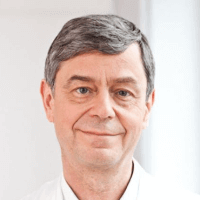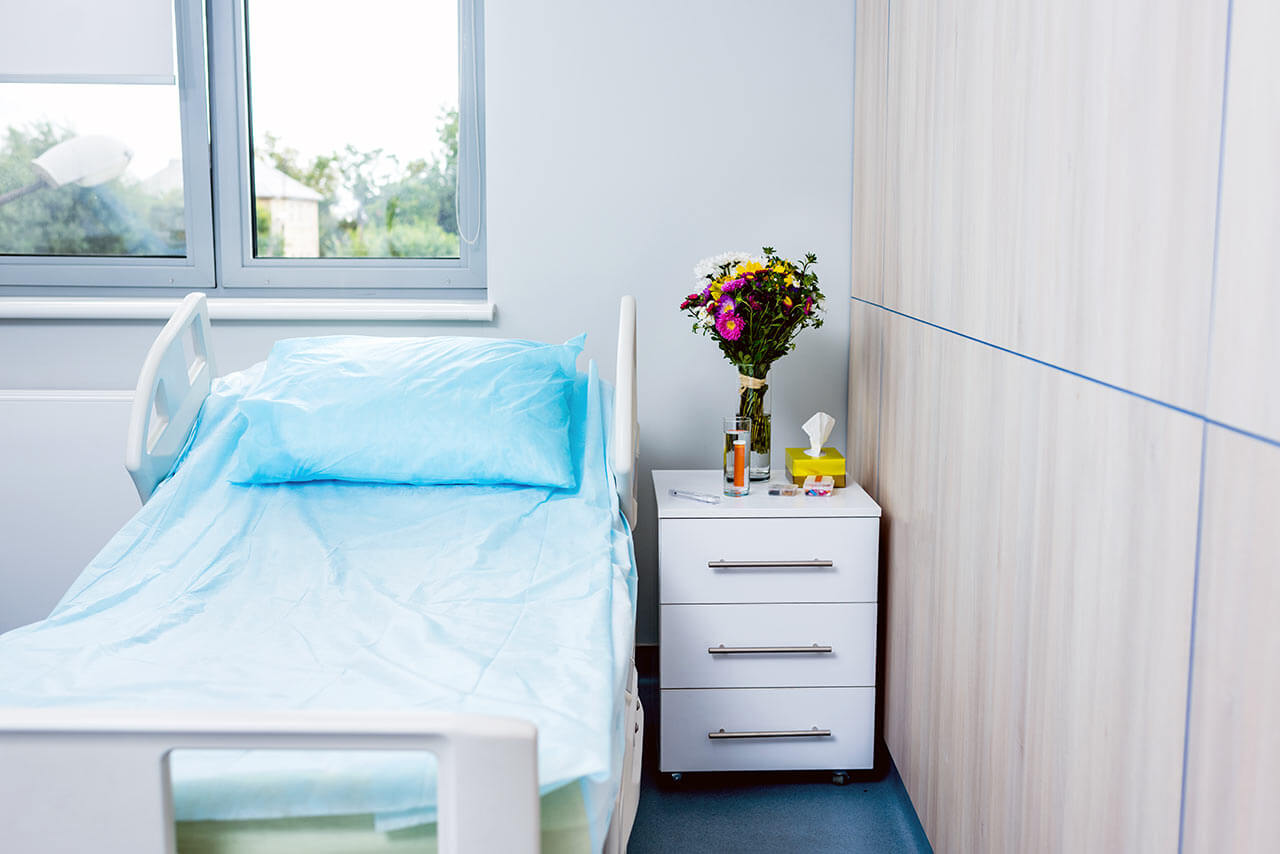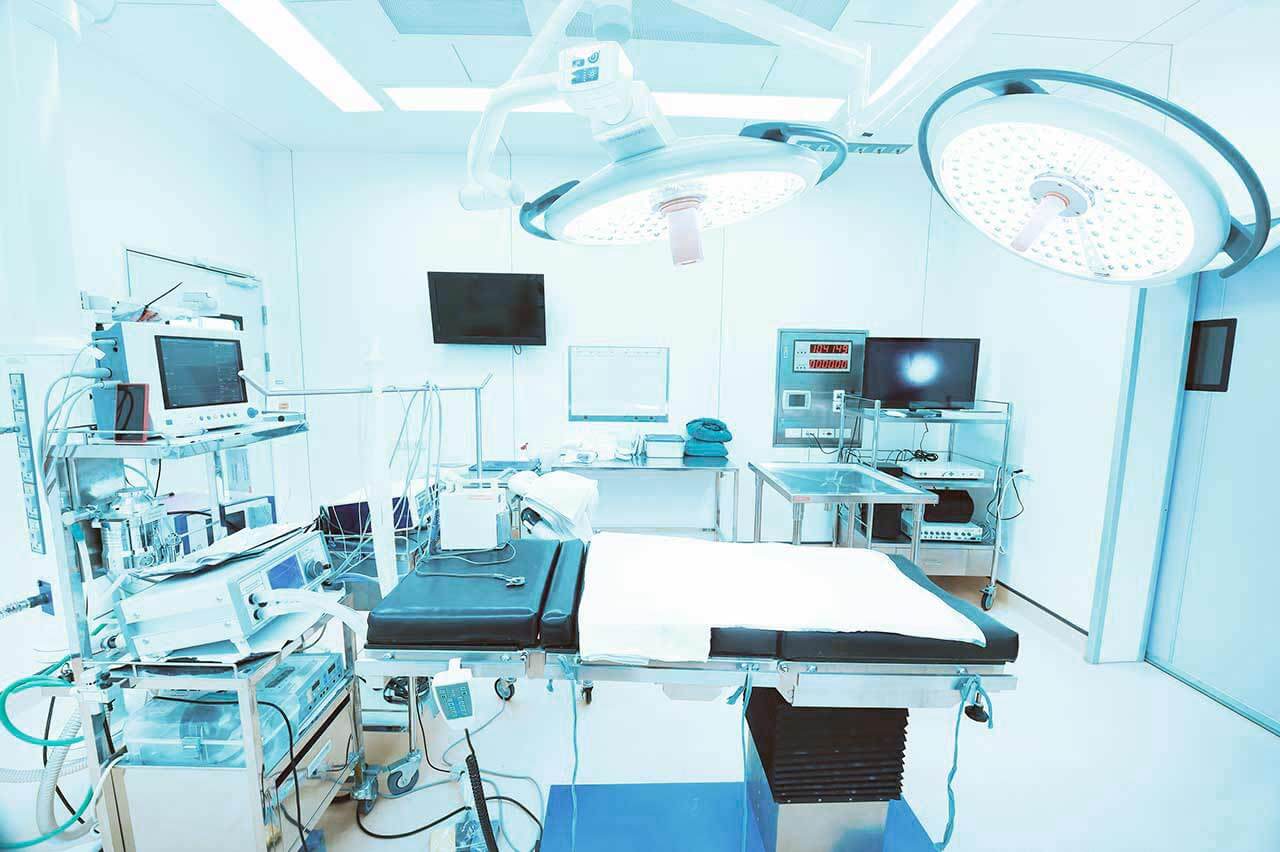
The program includes:
- Initial presentation in the clinic
- clinical history taking
- review of medical records
- physical examination
- x-ray examination of the foot
- CT/MRI (if clinically indicated, additional cost is 650/1200€)
- nursing services
- consultation of related specialists
- treatment by chief physician and all leading experts
- explanation of individual treatment plan
- written statement
Required documents
- Medical records
- MRI scan (if available)
Service
You may also book:
 BookingHealth Price from:
BookingHealth Price from:
About the department
The Department of Hernia Surgery, Orthopedic Surgery, Endocrine Surgery and Neurosurgery at the Eilenriede Clinic Hannover provides the full range of modern surgical interventions in the areas of its specialization. The team of the department's doctors successfully performs surgical interventions for inguinal and umbilical hernia repair, surgical procedures for thyroid pathologies, interventions on the central and peripheral nervous system, as well as joint preservation surgery, knee, hip and shoulder arthroplasty. Many surgical interventions are performed on an outpatient basis, which eliminates the need for hospitalization. The pride of the department is its modern operating rooms with state-of-the-art equipment. Advanced surgical equipment allows performing a large number of interventions using sparing minimally invasive surgical techniques, which have several advantages over classical open surgery. Special attention should be paid to the professionalism of the department's doctors, who make every effort to provide the patient with high quality treatment and the best therapeutic result.
The Head Physician of the department is Prof. Dr. med. Philipp Lobenhoffer. According to the Focus magazine, the specialist has been ranked among the top German doctors specializing in knee surgery for 10 years. The professor can boast of more than 20,000 successfully performed surgical interventions.
The department admits a large number of patients with inguinal and umbilical hernias. An inguinal hernia is characterized by a protrusion of internal organs outside the abdominal cavity through an enlarged inguinal canal, while an umbilical hernia is a protrusion of internal organs through the anterior abdominal wall, namely through an expanded umbilical ring. The diagnostic protocol for patients with suspected abdominal hernia includes clinical examination, analysis of the medical history and instrumental tests: herniography, ultrasound scanning, CT scanning and others. The only effective treatment for inguinal and umbilical hernias is surgery. Conservative therapy is used only as an adjunct treatment to improve the patient's general health condition and relieve pain after surgery. The department's doctors prefer minimally invasive surgical techniques, but if necessary, they also resort to open surgery. Hernioplasty (surgical procedure for hernia repair) is most often elective surgery, so the attending physician determines the optimal type of intervention, based on the results of the preliminary diagnostic examination. The department's specialists always strive to carry out a laparoscopic procedure, which involves abdominal wall plastic repair using miniature instruments inserted through several punctures in the affected area. In most cases, umbilical and inguinal hernia repair surgery involves the placement of a special mesh, which strengthens the abdominal wall and prevents the recurrence of the pathology, but in the case of the umbilical hernia, it is also possible to perform tension hernioplasty using the patient's own tissues. The intervention is performed under general anesthesia. The patient can leave the hospital and return to daily life within a few days after the surgical treatment.
The department's team of orthopedic surgeons consists of four highly qualified specialists with long experience in the surgical treatment of musculoskeletal diseases. The doctors are competent in arthroscopic interventions, cartilage and ligament reconstruction surgery, soft tissue surgery and corrective osteotomy. Particular focus is on partial and total knee, hip and shoulder arthroplasty. These interventions are often the only effective treatment for degenerative joint diseases or joint traumatic injuries. At the stage of preparation for treatment, the doctor accurately plans the operation and selects the optimal type of endoprosthesis in accordance with the patient's anatomical features. Whenever required, endoprosthesis is custom-made. A decisive advantage for the department's patients is the fact that almost all joint replacement surgeries are performed using minimally invasive techniques. To achieve high accuracy in positioning the artificial joint during operations, computer-assisted navigation is used. After surgery, doctors carry out follow-up examinations and prescribe physiotherapy rehabilitation procedures for the quickest possible mobilization of the patient.
Another important area of work of the department's team of doctors is the surgical treatment of thyroid diseases. This type of endocrine surgery is most often required for patients with nodular goiter, hyperthyroidism, and thyroid cancer. Thanks to the availability of modern medical equipment, interventions for thyroid diseases are performed using minimally traumatic techniques: the surgeon makes a 1,5-2 cm skin incision in the neck, through which inserts special surgical instruments and a camera that transmits images of the surgical field to the screen in multiple zoom. In some cases, a transoral approach is also used for thyroid removal or resection, which completely excludes skin incisions. When performing thyroid surgery, doctors use modern intraoperative neuromonitoring systems that allow them to maintain the integrity of the recurrent laryngeal nerves and vocal cords, which helps to reduce surgical risks.
The department also offers the services of a team of neurosurgeons who carry out diagnostics and surgical treatment of diseases of the nervous system: pathologies of the brain, skull base, spine, spinal cord and peripheral nerves. The department's specialization in neurosurgery includes microsurgical and minimally invasive operations on the nervous system, as well as CT-guided periradicular therapy for chronic back pain. Special attention is paid to spinal surgery (surgical treatment of spinal disc herniation and spinal stenosis), brain surgery for benign and malignant neoplasms, cerebral aneurysms, vascular malformations and other brain pathologies, as well as interventions for peripheral nerve compression. During neurosurgical interventions, the department's doctors use neuronavigation systems and devices for intraoperative electrophysiological monitoring, which ensure high safety of the surgical treatment. Prior to the surgical intervention on the brain, doctors usually plan the upcoming operation with the use of computed tomography, which avoids damage to vital anatomical structures of the brain.
The department's main clinical focuses include:
- Hernia repair surgery
- Inguinal hernia repair surgery
- Umbilical hernia repair surgery
- Orthopedic surgery
- Partial and total knee, hip and shoulder arthroplasty
- Arthroscopic interventions
- Cartilage tissue and ligament reconstruction surgery
- Corrective osteotomy
- Endocrine surgery
- Surgical treatment of thyroid disorders: nodular goiter, hyperthyroidism, and thyroid cancer
- Neurosurgery
- Brain surgery for benign and malignant neoplasms, cerebral aneurysms, vascular malformations
- Minimally invasive interventions on the spine – treatment of spinal disc herniation and spinal stenosis
- CT-guided periradicular therapy for chronic back pain
- Surgery for peripheral nerve compression
- Other medical services
Curriculum vitae
Higher Education and Professional Career
- Study of Medicine and doctoral thesis defense at the Georg August University of Goettingen.
- Advanced training at the Surgery Center of the Hannover Medical School (MHH) and in the Department of Orthopedics at the University Hospital of Ludwig Maximilian University of Munich.
- 1990 - 1997 Senior Physician and Managing Senior Physician, Department of Trauma Surgery at the Hanover Medical School (MHH).
- Habilitation in Trauma Surgery.
- 1998 - 2009 Head Physician of the Department of Trauma Surgery and Reconstructive Surgery at the Diaconal Hospital Henriettenstiftung, Hannover.
- Head of the Department of Hernia Surgery, Orthopedic Surgery, Endocrine Surgery and Neurosurgery at the Eilenriede Clinic Hannover.
Awards, Prizes and Honors
- Michael Jäger Prize.
- GOTS Beiersdorf Prize.
Memberships in Professional Societies
- 2003 - 2007 President of the Society for Arthroscopy and Joint Surgery (AGA).
- 2002 - 2004 Vice President of the German Society for Orthopaedic and Traumatologic Sports Medicine (GOTS).
- Honorary Member of the Society for Arthroscopy and Joint Surgery (AGA).
- Honorary Member of the German Society for Orthopaedic and Traumatologic Sports Medicine (GOTS).
- Associate Member of the American Trauma Society, Austrian Society for Trauma Surgery.
- Member of the ACL Study Group.
- Member of the International Society of Arthroscopy, Knee Surgery and Orthopaedic Sports Medicine (ISAKOS).
- Member of the European Society of Sports Traumatology, Knee Surgery and Arthroscopy (ESSKA).
Publications
- Author of four books.
- More than 270 publications as an author and co-author, 15 chapters in books.
- More than 1,000 lectures worldwide.
Photo of the doctor: (c) Eilenriede Klinik
About hospital
The Eilenriede Clinic Hannover positions itself as one of the best medical complexes in Germany, where patients are provided with highly effective treatment in accordance with European medical standards. The main clinical focuses of the medical facility include general surgery, hand surgery, neurosurgery, plastic and aesthetic surgery, gynecology, urology, orthopedics, internal medicine and phlebology. The clinic has state-of-the-art medical equipment that allows for high-precision diagnostics and quality treatment of a wide range of diseases, including especially complex ones. A distinctive feature of the medical facility is a cozy and welcoming environment, which contributes to the restoration of physical health and mental balance of patients.
The clinic offers its patients a competent team of highly qualified doctors, who take pride in their thorough clinical training, long experience and exceptional professional skills. The specialists use only modern and effective methods of evidence-based medicine in their work. The doctors adhere to the principle of personalized medical care, and therefore they devote enough time to counselling patients and carefully plan a treatment regimen according to the patient's particular needs and wishes. Combined with the use of advanced therapeutic techniques, such an approach gives excellent results.
Not only German citizens, but also many foreign patients from different countries of the world, including the USA, Great Britain, the United Arab Emirates and the CIS countries, entrust their health to the doctors of the clinic. The clinic is proud of its reputation in the German medical arena and does everything possible to restore the health of patients and provide them with a decent quality of life.
Photo: (с) depositphotos
Accommodation in hospital
Patients rooms
The patients of the Eilenriede Clinic Hannover live in comfortable single and double rooms with a modern design. Each patient room has an ensuite bathroom with shower and toilet. Standard room furnishings include an automatically adjustable bed, bedside table, wardrobe, table and chairs for receiving visitors, telephone and TV. The patient can connect his gadgets to Wi-Fi, if desired.
The hospital also offers patients enhanced-comfort rooms. These rooms also have an ensuite bathroom, but instead of a shower, patients can relax in a warm bath. The rooms have upholstered furniture, a safe and a mini fridge.
Meals and Menus
The patient and the accompanying person are provided with three delicious meals a day. Breakfast and dinner are served buffet style, and a choice of three set menus is available for lunch. All meals are cooked with fresh ingredients and seasonal vegetables, following healthy food standards.
If you are on a specific diet for any reason, you will be offered an individual menu. Please inform the medical staff of your dietary preferences prior to the treatment.
Further details
Standard rooms include:
Religion
The services of representatives of religions are available upon request.
Accompanying person
During an inpatient program, an accompanying person can stay with you in the patient room or in a hotel of your choice.
Hotel
During an outpatient program, you can stay in a hotel of your choice. The managers will help you choose the most suitable options.




